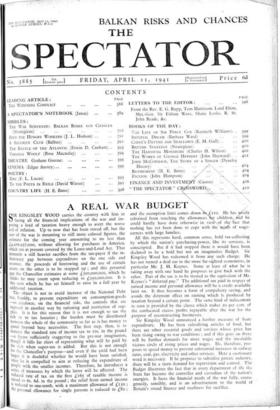A REAL WAR BUDGET OR KINGSLEY WOOD carries the country
with him in 13 facing all the financial implications of the war and im- posing a load of taxation heavy enough to avert the worse evil of inflation. Up to now that has been staved off, but the cost of the war is mounting to still more colossal figures, the estimate for the coming year amounting to no less than £4,206,957,000, without allowing for purchases in America, which are at present covered by the Lease-and-Lend Act. That demands a still heavier sacrifice from the tax-payer if the in- flationary gap between expenditure on the one side and revenue, the proceeds of borrowing and the use of certain assets on the other is to be stopped up ; and this potential gap the Chancellor estimates at some £500,000,000, which he thinks he may count upon reducing to £250,000,000. It is this sum which he has set himself to raise in a full year by additional taxation.
The object is not to avoid increase of the National Debt but, frankly, to prevent expenditure on consumption-goods :--to reinforce, on the financial side, the controls that are imposed in another way by rationing and restriction of sup- plies. It is for this reason that it is not enough to tax the rich or to tax luxuries ; the burden must be distributed between the whole of the community so far as iL has money to Spend beyond bare necessities. The first step, then, is to Increase the standard rate of income tax to los. in the pound —a figure sufficiently staggering to the pre-war imagination, though it falls far short of representing what will be paid by the rich when super-tax is added. But this is not enough for the Chancellor's purpose—and even if the yield had been larger it is doubtful whether he would have been satisfied, since he is compelled to aim at reducing the expenditure of Pe°.Ple with the smaller incomes. Therefore, he introduces a series of measures by which the latter will be affected. The reduced rate of tax on the first £165 of taxable income is ra'sed to 6s. 6d. in the pound ; the relief from earned income LS reduced to one-tenth, with a maximum allowance of £150; Ine Personal allowance for single persons is reduced to £80; and the exemption limit comes down 110. He has rscly refrained from touching the allowances •r children, ‘nd he could hardly have done otherwise in vie of th9 fact that nothing has yet been done to cope with the 'agais of wage- earners with large families.
All this represents hard, common sense, bold tax-collecting by which the nation's purchasing-power, like its services, is conscripted. But if it had stopped there it would have been declared to be a bold but not an imaginative Budget. Sir Kingsley Wood has redeemed it from any such charge. He has not turned a deaf ear to the more far-sighted economists, in particular Mr. J. M. Keynes. Some at least of what he is taking away with one hand he proposes to give back with the other. Part of the tax is to be treated as the equivalent of Mr. Keynes's "deferred pay." The additional tax paid in respect of earned income and personal allowance will be a credit available later on. It thus becomes a form of compulsory saving, and avoids the deterrent effect on earning which is produced by taxation beyond a certain point. The same kind of inducement to earn is provided by the clause which makes 20 per cent. of the confiscated excess profits repayable after the war for the purpose of reconstructing businesses.
Sir Kingsley Wood announced a further mcasure of State expenditure. He has been subsidising articles of food, but there are other essential goods and services whose price has been rising owing to war conditions ; and if this goes on there will be further demands for more wages and the inevitable vicious circle of rising prices and wages. He, therefore, pro- poses to spend money to prevent substantial increases in i ailway rates, coal, gas, electricity and other services. Here a cautionary word is necessary. If he proposes to subsidise private industry, there will be a stern demand for supervision and control. The Budget illustrates the fact that in every department of life the State has become the controller and custodian of the nation's energies. It faces the financial needs of the war fully, coura- geously, sensibly, and is an advertisement to the world of Britain's sound finance and readiness for sacrifice.






























